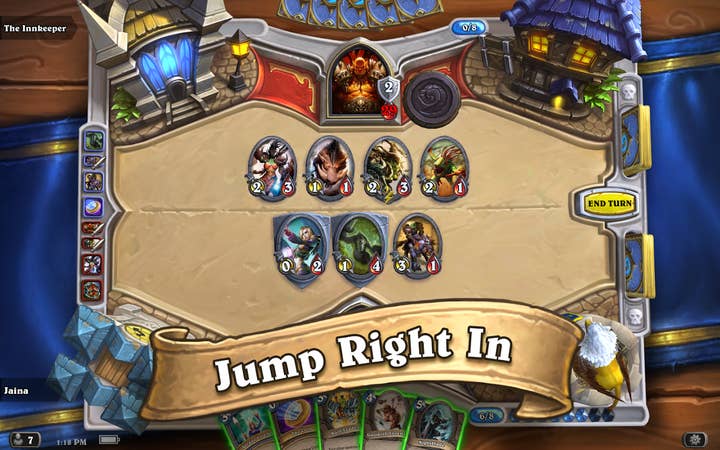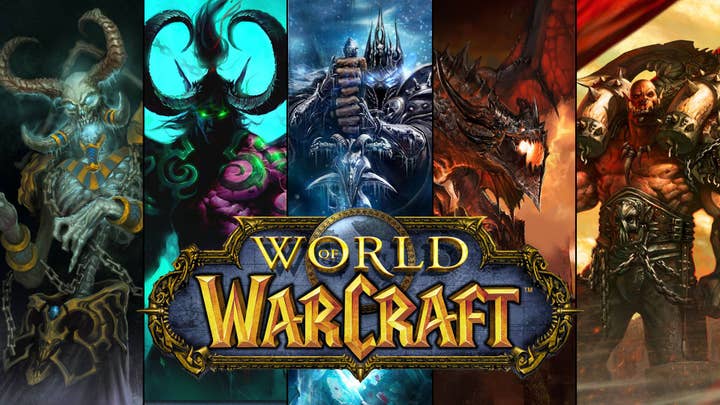"Games aren't really supposed to be easy at all times"
Blizzard legend Rob Pardo on the importance of keeping a few "sharp edges"
Rob Pardo's tenure at Blizzard can be characterised in a number of ways, but IP like Starcraft, Diablo and World of Warcraft on your CV, there's always the option of summarising your career as 'remarkably successful', or 'hugely profitable'. Core to many of his achievements, and those of the teams he was a part of, was the ability to make deep, complex systems accessible and un-intimidating - to bring a level of polish to many faceted gems. That skill is one of the holy grails of game design: the balance between engrossing complexity and immediately engaging appeal, the classic mantra of simple to learn, hard to master. Unsurprisingly for one who has exhibited such finesse in the technique, Pardo sees that balance as a key factor in making a great game, but knows that where you decide to rest on that sliding scale depends entirely on what you're making and for whom.
"You're always, as a game designer, trying to figure out what's the thing that causes the right amount of frustration and challenge," the Blizzard veteran tells me during a chat at Unite 2015 in Boston last month. "When the player overcomes it, it should feel really like a huge accomplishment or achievement. But remember, they're going to go through some frustration and pain and challenge. I think that's a lot of the art of game design: trying to figure out which is which.
"I do think, and we talked about this in World of Warcraft sometimes, in the quest to continually make the game more accessible and understandable and intuitive, sometimes you shave away the sharp edges. But some of those sharp edges are sometimes the very thing that makes the game compelling. Games aren't really supposed to be easy at all times. Right? I think what's important as a game designer is that you're intentional about your design. I definitely don't think that WoW is the perfect game. I definitely think you can make a more hard core game, you can make a more accessible game. It's just trying to be intentional about it."
"in the quest to continually make the game more accessible and understandable and intuitive, sometimes you shave away the sharp edges. But some of those sharp edges are sometimes the very thing that makes the game compelling"
Blizzard's approach to design can be broadly typified by this polish and sheen, and the numbers speak for themselves when in any assessment of the success of that methodology. Nonetheless, there are always those are going to find WoW too cartoon-like, Diablo too automated, or Hearthstone too simplistic. Sometimes people want obscurity, or roughness, or just a different type of polish. Pardo has no argument with that.
"I did this talk at GDC several years ago," he recollects. "It was about the Blizzard game design values and I kind of put these different mantras up on the screen that we've been using for years, kind of a Blizzard-essence that describes different things that we care about, the game mechanics. Some of it was just kind of sharing what those values were and how we thought about things. The other part of the message was that those values don't necessarily work at other studios. Those values are unique to Blizzard.

"If Valve had done the game design value talk, they have very different values from Blizzard, and they do very, very successful games also. What I think's important is you are kind of intentional about it. There's things you care about and you understand trade-offs, because almost everything in game design is about trade-offs. There's no such thing as making the game that everyone loves, you need to kind of leave that at the door.
"Even though WoW captured a much bigger audience than everyone, including us, thought was possible, we never really thought we were going to capture everybody. We're really trying to get everyone that enjoys Blizzard games to maybe want to try MMOs. That was kind of what we were being intentional about. There's even plenty of designs within WoW that we knew were going to create a barrier or a wall and we might lose some people.
"Even with dungeons, we had a lot of debate inside the studio about the dungeons that had this really awesome content and really cool encounters and some of the best story lines and quest lines. You'd get quests in your log that drive you to the dungeon, but we had a lot of players that really enjoyed playing the game by themselves and didn't want to be in groups. There's a big push inside the studio from some of those folks that, 'Hey, can't you make a single player version of these dungeons?' That was an example where we chose to not make it more accessible because we felt by doing that, the people that really love dungeons would actually love them a little less."
"There's no such thing as making the game that everyone loves, you need to kind of leave that at the door."
Pardo has probably come closer than most to the impossible goal of a game which is universally admired, but despite making some of the most popular games ever produced, he still enjoys the niche, too, with a healthy respect for tough games and dense systems. Speaking about difficulty, density and the difference between the two, we talk for a while about Dwarf Fortress, by which I mean I subject him to my talking about it for a while, and he tells me that he's been spending a lot of time playing Don't Starve, enjoying the challenge of perma-death. For Pardo, games like these are one of the great advantages of small teams - the ability to take bigger risks and aim for a tighter audience, to step away from some of the more well-worn paths of large scale development.
"People are always looking for inspiration from the games that came before," he says when I ask him if he thinks the retro-revival movement is indicative of an industry in a creative rut. "I think it's just really natural, too, because most people who get into the game industry, we got into it because we loved games. We think maybe we'd like making games, so we get into the industry. We're inspired by that. I think every entertainment medium's like that. I think you see it, and clearly you see it in music, you see it in movies, so it's this natural progression.

"In the middle of sometimes recycling things or doing another iteration, you also see the new ideas and the innovations. Just maybe it's more obvious right now because there are so many more games. I think we went through a time, a phase, let's say five years ago and older than that, where there's just a lot less games because the barrier to entering in the marketplace was so much higher.
"It's a little risky to put a game in the market that you have to have a big budget on that might partially kill players, but now I think people of the independent game community can take these game play risks, and they're okay with smaller communities of players. Sometimes, the conventional thinking is wrong, and you create a huge community of players."
"In the middle of sometimes recycling things or doing another iteration, you also see the new ideas and the innovations. Just maybe it's more obvious right now because there are so many more games."
If you want an example of Blizzard opening up a conventionally opaque genre, you need look no further than Hearthstone. With it, Blizzard turned months of vertical learning into a pick-up-and-play game which has brought both players and dollars to the publisher in the millions. It was also vastly different from many of Pardo's projects for the company - made in Unity with a small team and a fraction of the budget, the developer admits that it was all something of an experiment.
"Hearthstone was really born out of...We had some ideas that might be interesting to do something in the online card game space, but a lot of it was just 'hey, could we make a Blizzard game with a smaller team? Do we need to keep on making our teams bigger and bigger and bigger?' It was as much an experiment around that as it was the game could be really successful. Like almost everything at Blizzard, we never think the game's going to be as successful as it turns out, which is an awesome place to be. There's definitely a lot of doubt early on. Is this the right place to put these guys? Even though it wasn't a lot of people, it's still really talented people."
The reason that I'm talking to Pardo at Unity's conference in the first place isn't that his team made Hearthstone with the engine, although I suspect the two aren't entirely unrelated. Pardo has been speaking at the Boston event because of his role of design advisor at large - a sort of travelling guru for Unity who's been visiting smaller teams around the world who are using the company's tech to build their games. Having experienced the small team environment first hand, and seen the enormous success it can generate, I ask if he thinks that the preponderance of indie development is going to cannibalise the AAA environment.
"Hearthstone was really born out of...We had some ideas that might be interesting to do something in the online card game space, but a lot of it was just 'hey, could we make a Blizzard game with a smaller team?"
"It's hard to speak across the entire industry on this, but obviously there's been a couple of examples. There's been Hearthstone. Child of Light, I think, was another example that was a smaller project born out of a bigger studio culture. I have a hard time seeing that this turns into this big trend, but I do think it's something as you start seeing these successes, it might be an opportunity for these bigger studios to be a little more risky with something.
"I really don't see the big triple-A projects going away anytime soon. Those are still super successful... I think what's really happening is you're seeing just a lot more opportunity out in the game space. It keeps on growing. The thing that I love about the game industry is once new technologies come online, very rarely do they somehow kill old platforms. What usually happens is it just creates this whole new ecosystem for games to exist. It's like now we have mobile games and PC games and console games. It's not like any one of those things have gone away. All of them continue to do extremely well."
As much fun as the Unity road trip has been, I get the sense that mentoring isn't the long term career path that Pardo sees himself as set upon. Thankfully for fans of his work, he sees it more as a chance to refresh before heading back into the fray.
"I'm still kind of spending some time thinking and really figuring it all out. I definitely learned a lot in the last year, year-plus now. Just having the opportunity to decompress and unplug. In a lot of ways, I really wish anyone that's been in the industry for more than ten years had the opportunity to take a meaningfully long sabbatical. Even from the standpoint of recharging your creative batteries a little bit and being able to read again and watch some movies and all that. That all said, I'll probably get a little more serious about doing something. I'm more towards the end of my sabbatical than towards the beginning."
This interview was conducted at Unite 2015 in Boston. GamesIndustry.biz was a media partner for the event and as a part of that arrangement, attendance, travel and accommodation costs were covered by the show organisers.

